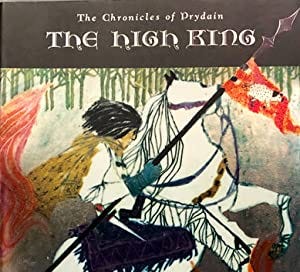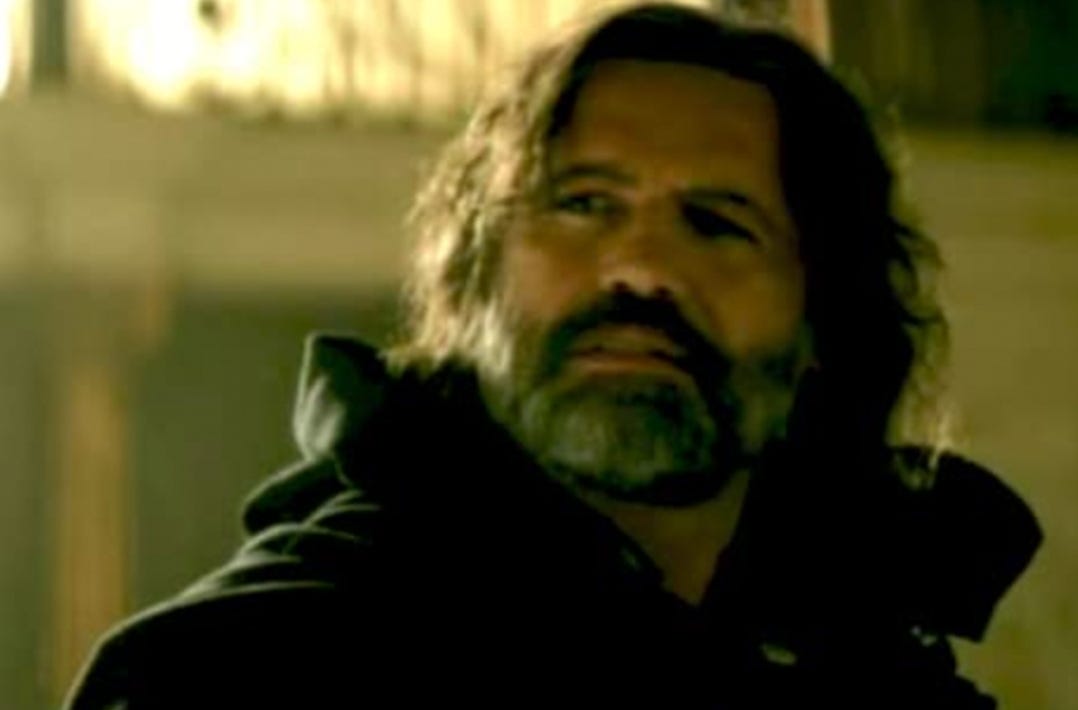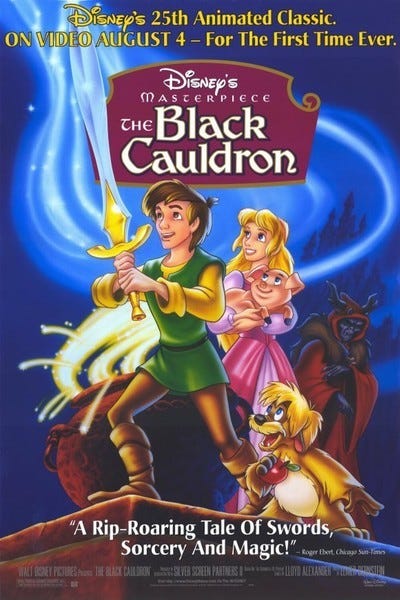1969: THE HIGH KING by Lloyd Alexander
Under a chill, gray sky, two riders jogged across the turf.
One of the strangest things in the history of fantasy fiction happened at 1:30am on February 10, 2015. That's when Winter Dragon, a thirty-minute pilot episode of an unproduced fantasy television series starring Billy Zane, aired in a paid programming slot on FXX, an expanded cable network mainly known for carrying Simpsons reruns and It's Always Sunny In Philadelphia. The pilot - here's the whole thing on YouTube - had laughably low production values, and most of it was focused on a single conversation in a single room, and also if you actually watch it it's very clear that the whole thing is an exercise in padding out runtime. There was no promotion or advertisement of any kind for this episode or the series overall, before or after the airing. No subsequent episodes were ever made or aired. As later confirmed by the pilot's director on Twitter, the shooting of a 22-page script and post-production were incredibly rushed. So what was this? Was somebody just trying to Wayne's World their own epic high fantasy series?
According to the company that produced the pilot, Red Eagle Entertainment, no, this was definitely a real thing that was always supposed to become a real TV show:
"[Winter Dragon is] a pilot for a high-budget production television series. We think there's huge demand for the television series internationally, and we're looking forward to producing it and getting it out in the marketplace…Certainly, we want fans to find out about it and be excited that there's a lot more to come."
Okay, great, let's just all take that statement at face value and move on. Except there's one other bit of information that might help explain why Winter Dragon aired the way it did: it was ostensibly an adaptation of The Wheel Of Time, a bestselling fourteen-novel fantasy series by Robert Jordan1, to which Red Eagle had held the intellectual property rights for about a decade. As it turned out, their contract specified that those rights were going to revert back to Jordan's estate unless Red Eagle was able to produce and air a pilot by - oh gosh, you're not going to believe this, what an incredible coincidence - February 11, 2015. As Robert Jordan's widow alleged in an angry statement, Red Eagle had slapped together a pilot and aired it at the last possible second to dig their fingernails into those IP rights and continue to keep them away from her and her family. This all went to court, and eventually got settled, and the rights went back to Jordan's widow, and last year Amazon produced a big-budget Wheel of Time series that we've all collectively agreed to forget.
I think it's obvious why Red Eagle would be desperate to hold onto the rights to a bestselling fantasy series: those rights can be worth some serious money. Adapting a popular genre fiction series into a film or television series may not be an absolute sure thing (say, if you're adapting Divergent), but it's pretty damn close. And a world as densely populated as Jordan's Wheel of Time series could turn into seasons and seasons of television for an already-dedicated fanbase, taking the rights holder past Hunger Games money or Twilight money and into the realm of Game of Thrones money, which would definitely have been the goal in 2015, back when many people thought Game of Thrones was good (and Red Eagle specifically pointed to Game of Thrones as their aspirational model). So of course Red Eagle crapped out a 22-page script and called an actor who was not busy doing anything else (Zane) and paid for infomercial time on the Simpsons channel to try and keep their rights. You and I would have tried to do the same thing.
This is all to say: nobody is ever going to try and do this with Lloyd Alexander's Chronicles of Prydain series, the final volume of which, The High King, received a Newbery medal in 1969.
The Chronicles of Prydain was not the first-ever "high fantasy" book series, but it might have been the first book series that was called "high fantasy", since that's a term that author Lloyd Alexander coined in an essay to describe fantasy set in a world different from our own - Lord of the Rings or Shrek - as opposed to fantasy set in a heightened version of our world - Harry Potter or Who Framed Roger Rabbit. Alexander had written other books for children before; his debut novel for young readers was a book about a housecat who could travel through time titled - this brings me so much joy to share with you - Time Cat.
Time Cat is not relevant to the rest of this essay but I hope future printings use my above cover design. The Chronicles of Prydain, a collection of five novels, was Alexander’s high fantasy magnum opus, based on his research into Welsh mythology as collected in the twelfth and thirteenth centuries. If you are noting, with some well-intentioned curiosity, that you're not that familiar with Welsh mythology and would be interested to read a story based on this body of work, you should know that the reasons you don't know anything about Welsh mythology are, first, that the stories aren't especially interesting, and, second, that all of the names in Welsh mythology are extremely confusing.
I’ve read plenty of genre fiction, I know that names can be very stupid, but in most of those works I can still tell characters apart pretty easily. Alexander just hits you with a wave of Ls and Ys, and on page sixty of The High King, when one of the characters yells “Gwystyl! Gwystyl of the Fair Folk!”, it’s all you can do not to sarcastically yell in your seat “Oh boy you mean it, it’s really Gwystyl? We can finally have Gwystyl join Gywdion and Glew? And let's not forget Fflewddur Fflam?!?!” since those are all names of other major characters in the book that you’ve already been trying to figure out how to tell apart as they try not to bungle or bobble the Fingal Dopple2.
Another issue is that Alexander and Tolkein certainly used a lot of similar conventions in their respective fantasy sagas, and every high fantasy author borrows from Tolkein at least a little, but Alexander borrows so much that it feels like he wanted to get sued. The main sidekick in Prydain is the shaggy animal-man Gurgi, who might strike you as a rip-off of Tolkein’s most famous little freak whose name also begins with G, and also Gurgi’s first line of dialogue in The High King is “No, no! Faithful Gurgi will keep on! He follows kindly master, oh yes, as he has always done. Never mind his shakings and achings! Never mind the droppings of his poor tender head!”, which sounds exactly like something that particular Tolkein character would say. And a major plot point in The High King involves the band of travelers trying to get through a treacherous snowy mountain pass, giving up, and instead cutting under the mountain via an even more treacherous abandoned dwarven mine, which, of course, is the exact plot of The Fellowship of the Ring. And the book ends with all of the characters sailing off to some Heaven-like land so a new era can dawn where “men unaided guide their own destiny” which is, again, the exact ending of the Lord of the Rings saga.
But in most other respects, this book ain't exactly Lord of the Rings.
It might not be fair to judge The High King without having read the previous four volumes in Prydain. But, given that Alexander explicitly states in a note before the novel that “like the previous tales, this adventure can be read independently of the others”, and given that I’m trying to get one of these pieces out every week as it is, I pressed ahead.
The protagonist of The High King and the full Prydain epic is Taran, who begins the series as an “assistant pig-keeper” but dreams of becoming a celebrated hero and warrior. By the start of The High King, he’s already done a great deal of growing up and gotten several heroic deeds under his belt, and developed a crush on the brave princess Eilonwy (come on). Prydain, while still ruled by the benevolent King Math (come on), is once again under threat by the evil Arawn, who begins the novel by stealing the magic sword Dyrnwyn (come ON), so you think, for the first third of the book, that Dyrnwyn is going to be, you know, The Thing That Everyone Is Trying To Get. But it’s not! They just explicitly abandon that plot after dedicating a full third of the book to it! Somebody just stumbles across it right before the book ends! Sorry you had to read those eighty pages!
“‘There is grave risk, and perhaps fatal risk, in leaving Dyrnwyn in Arawn’s grasp,” Gywdion went on. ‘Yes we must face the more pressing danger. No longer will I seek the black sword. Whatever strength it may yield him, in my own strength I will stand against him to the death. I ride not to Annuvin but to Caer Dathyl [come on]."
Unfortunately, "sorry you wasted your time reading the previous five chapters" is a recurring theme in The High King, a fantasy story that is strikingly repetitive. The characters all get together, there's a betrayal, there's a battle, another character shows up out of nowhere to save everyone and end the battle, everyone resets, and then that whole sequence happens four or five more times, with no meaningful changes between. There are one or two memorable bits - the ending feels like a nice way to wrap up a fantasy epic, and Fflewddur Fflam gets a moving scene where he saves everyone during a snowstorm - but ultimately, there's just not enough here to make this stand out as a fantasy epic.
So, as you might expect, nobody is about to try and turn Prydain into a hit movie series today. Somebody - Disney - already tried it once. And it did not go well.
Disney’s The Black Cauldron, which is based on the second Prydain novel (itself a Newbery finalist), came out in 1985 and was a milestone in the history of animation; it was the highest-budget animated film ever made at the time, and the first animated film, ever, to incorporate CGI into the animation process. Unfortunately, production was hit by every possible setback, and even after Disney got through all of that, it seems like the animators did too good a job, because the test screenings infamously had children running out of the theater screaming and crying because they were too scared, and the film had to have twelve minutes cut for being too dark, leaving the final movie with significant continuity gaps in the climactic battle scene. The movie was a massive commercial failure and Disney did not release it on home video for years; had it not been immediately followed by the much more successful Great Mouse Detective, it’s possible Disney’s animation division would have gone under entirely. You can stream The Black Cauldron on Disney+ right now if you really want, but I don’t know if I’d recommend “wanting” to do that. Here was Lloyd Alexander’s review of the movie, from an interview he gave to Scholastic in the 90s:
“First, I have to say, there is no resemblance between the movie and the book. Having said that, the movie in itself, purely as a movie, I found to be very enjoyable. I had fun watching it. What I would hope is that anyone who sees the movie would certainly enjoy it, but I'd also hope that they'd actually read the book. The book is quite different. It's a very powerful, very moving story, and I think people would find a lot more depth in the book.”
It’s always thrilling to hear an author praise the film adaptation of their book by saying “yeah this really isn’t like my book, my book was way better and I really hope people just read my book, which is deeper and more moving than whatever that was supposed to be.” Disney had optioned all five Prydain books in the eighties, intending to turn this into a series, and that obviously didn’t happen, and there obviously isn’t a “Journey Into Prydain” dark ride in the Magic Kingdom, although there once was a restaurant at the park named Gurgi’s Munchies and Crunchies.
Disney still has the rights to Prydain, and rumor has it that they're trying to make another adaptation, but Variety first reported on that rumor six years ago and, well, it appears that Disney is not in a hurry to get that done.
One interesting idea in The High King is Arawn, the villain, being a threat specifically to the culture and shared history of Prydain. As Taran puts it:
“I have been told the treasure troves of Annuvin hold all that men could wish for. Plows, there are said to be, that work of themselves, scythes that reap with no hand to guide them, magical tools, and more. For Arawn stole the craft secrets of metalsmiths and potters, the lore of herdsmen and farmers. This knowledge, too lies locked forever in his hoard.”
This is reinforced several times throughout the novel; Taran finds his strength to begin the journey after meeting with a potter and deciding to fight for the beauty of his craftsmanship. Later, when the travelers visit another palace and view their king’s most prized possessions: written records of the stories and folklore and traditions from his people:
“Have you seen its true pride and priceless treasure? It is here. Stored in this Hall of Lore is much of Prydain’s ancient learning. Though Arawn Death-Lord robbed men of their craft secrets, he could not gain the songs and sayings of our bards…Memory lives longer than what it remembers, and all men share the memories and wisdom of all others.”
The stories and traditions that we share with each other are what have the most value, are the things we must work to protect. In this era when everything is a potential streaming hit, this idea takes on a cynical new meaning, as people scramble to assemble television pilots and option full book series to hold onto the valuable rights to various intellectual properties. But Prydain is a fantasy series that, bucking the trend we see everywhere today, actually lost a ton of money, that wasn’t really worth very much as an IP at all. Adapting a popular genre fiction series into a film or television series may not be an absolute sure thing, but it's pretty damn close; Prydain is the case study of the fantasy series that wasn't a sure thing. The High King strikes me as an extremely watered-down - or wwatyryrrd-dyywn - introduction to high fantasy, and I'm not really surprised that the Prydain series couldn't translate into a hit film for a broad audience. But rest assured I'm showing up for the midnight release of the Time Cat movie, whenever it gets made.
Newburied is a series by Tony Ginocchio on the history of the Newbery Medal and a whole bunch of other stuff related to it. You can subscribe via Substack to get future installments sent to your inbox directly. The next installment will cover the 1991 medalist, Maniac Magee by Jerry Spinelli.
And completed by Brandon Sanderson after Jordan's death.
There’s an informal rule in fiction writing that you should try not to have two major characters with names that start with the same letter, to make it easier for readers to tell everyone apart. Authors break this rule all the time, but they’re usually much better at doing that.






